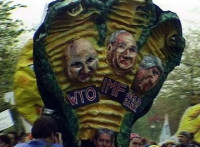The Money Lenders Filming Locations

Where was The Money Lenders filmed? The Money Lenders was filmed in 5 locations across Bolivia, Brazil, Ghana, Philippines and Thailand in the following places:
The Money Lenders Filming Locations
Bolivia is a country in central South America, with a varied terrain spanning Andes Mountains, the Atacama Desert and Amazon Basin rainforest. At more than 3,500m, its administrative capital, La Paz, sits on the Andes’ Altiplano plateau with snow-capped Mt. Illimani in the background. Nearby is glass-smooth Lake Titicaca, the continent’s largest lake, straddling the border with Peru.
The Philippines, officially the Republic of the Philippines, is an archipelagic country in Southeast Asia.
Thailand is a Southeast Asian country. It's known for tropical beaches, opulent royal palaces, ancient ruins and ornate temples displaying figures of Buddha. In Bangkok, the capital, an ultramodern cityscape rises next to quiet canalside communities and the iconic temples of Wat Arun, Wat Pho and the Emerald Buddha Temple (Wat Phra Kaew). Nearby beach resorts include bustling Pattaya and fashionable Hua Hin.
The Money Lenders (1991)
Critical investigation of The World Bank and IMF. Too hot for PBS, but prime time TV everywhere else. Do the World Bank and IMF make the poor even poorer? Are the Bank and IMF democratic institutions? Why do people demonstrate against the Bank and IMF? For the first time, a documentary global investigation of major criticisms of the World Bank and the International Monetary Fund (IMF), two of the most powerful financial institutions in the world. Five country case studies are presented, each concentrating on a different aspect of critics' charges: 1. Bolivia: Debt, Drugs and Democracy 2. Ghana: The Model of Success 3. Brazil: Debt, Damage and Politics 4. Thailand: Dams and Dislocation 5. Philippines: The Debt Fighters. The charges, including those related to structural adjustment, are controversial and provocative. Some go to the heart of the power and policies of these institutions. They are made by economists, journalists, sociologists; church, labor, environmental, government and community leaders; and ordinary people from these countries who are perceived by critics to be victims of IMF and World Bank policies and projects. Responses to criticisms are presented by the World Bank Senior Vice President, the IMF Deputy Managing Director and top current and past government officials from each country. Bank/Fund history and decision-making processes are also included in this valuable teaching tool. "Clear and comprehensive... admired the way in which you were able to bring an in-depth exploration of these complex issues to life." -UN Development Program "Well balanced...Excellent...Superior." -U.S.A. Gabriel Awards "Thought provoking." -Bank Check Quarterly PBS would not telecast The Money Lenders because "it has a perception of bias in favor of the poor." Despite this allegation, Video Librarian magazine recommends it as an "interesting look at both sides of the issue..." It was a prime time telecast in the 1990s throughout Europe, updated in 2000 for educational institutions and is currently used in hundreds of college classrooms.
